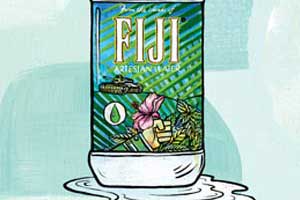
Fiji Water spokesman Rob Six has posted a response to our story at the company’s blog. Writer Anna Lenzer replies:
Six’s key points are the same he and other Fiji executives have repeatedly made, and which are reflected in detail in my story: Donating money for water access projects or kindergartens is laudable, and I discuss Fiji’s charitable projects in Fiji (despite numerous requests, Fiji wouldn’t disclose how much it spends on most of these projects). The piece also makes it clear that Fiji Water accounts for significant economic activity in Fiji, and company executives are quoted to that effect.
Six doesn’t address the key questions raised in my Mother Jones story, from the polluting background of Fiji Water’s owners past and present, to the company’s decision to funnel assets through tax havens, to its silence on the human rights abuses of the Fijian government. My piece doesn’t argue that Fiji Water actively props up the regime, but that its silence amounts to acquiescence.
“We cannot and will not speak for the government,” Six writes. I didn’t ask them to speak for the government, I asked them to comment on it. Though Fiji Water casts itself as a progressive, outspoken company in the US, it has a policy of not discussing Fiji’s regime “unless something really affects us,” as Six was quoted in the story.
The regime clearly benefits from the company’s global branding campaign characterizing Fiji as a “paradise” where there is “no word for stress.” Fiji’s tourism agencies use Fiji Water as props in their promotional campaigns, and the company itself has publicized pictures of President Obama drinking Fiji Water. This is a point repeatedly made by international observers, including a UN official who in a recent commentary (titled “Why Obama should stop drinking Fiji water”) called for sanctions on Fiji, and singled out Fiji Water as the one company with enough leverage to force the junta to budge. Yet the most pointed criticism the company has made of the regime was when it opposed a tax as “draconian;” it has never used language like that to refer to the junta’s human rights abuses.
It’s worth remembering that there aren’t very many countries ruled by military juntas today, and Americans prefer not to do business with those that are. We don’t import Burma Water or Libya Water.
As to Six’ point that the company didn’t know I was in Fiji: I did contact Fiji Water before my trip, and Six mentioned that the company was “thinking about taking a group of journalists to Fiji”; I didn’t follow up about joining such a trip. Despite news reports showing that Fiji wouldn’t cooperate with journalists who went there independently, I chose to do so and visited the factory on a public tour. I had planned to speak to Fiji Water’s local representatives, and to visit the surrounding villages, afterward. But it was at that point that I was arrested by Fijian police, interrogated about my plans to write about Fiji Water, and threatened with imprisonment and rape. After that incident, personnel at the US embassy strongly encouraged me not to visit the villages. I did discuss my trip to the islands with Six after I returned, and had extensive correspondence with him on numerous questions, many of which he has not addressed to this day. Here are some issues Fiji Water could address in public:
– Why won’t the company disclose the total amount of money that Fiji Water spends on its charity work? Do its charitable contributions come close to matching the 30 percent corporate tax rate it would be paying had it not been granted a tax holiday in Fiji since 1995?
– Will Fiji Water owners Lynda and Stewart Resnick, who in the company’s PR materials contrast our tap water supply with the “living water” found in their bottles, disclose the full volume of pesticides that their farming and flower companies use every year? Could limiting those inputs create better water here at home?
– Fiji touts its commitments to lighten its plastic bottle (which is twice as heavy as many competitors’) by 20 percent next year, to offset its carbon emissions by 120 percent, and to restore environmentally sensitive areas in Fiji, but its public statements never acknowledge that these projects are, in many cases, still on the drawing board or in the negotiating stages. Why?
Read Six’ post after the jump.
Monika Bauerlein and Clara Jeffery are the Co-Editors of Mother Jones. You can follow them on Twitter here and here.
From Fiji Water spokesperson Rob Six:
We strongly disagree with the author’s premise that because we are in business in Fiji somehow that legitimizes a military dictatorship. We bought FIJI Water in November 2004, when Fiji was governed by a democratically elected government. We cannot and will not speak for the government, but we will not back down from our commitment to the people, development, and communities of Fiji.
We consider Fiji our home and as such, we have dramatically increased our investment and resources over the past five years to play a valuable role in the advancement of Fiji.
It is true that Fiji is a poor country, but we believe that the private sector has a critical role to play to address the underserved areas of Fiji’s development, with special attention to economic opportunities, health, education, water and sanitation.
First, we employ nearly 350 Fijians in a rural part of Fiji with very little economic opportunity. We are one of the highest paying employers in the country with an annual payroll of nearly $5 million; we provide health care and other fringe benefits; and we have created advancement opportunities for women. There are also a number of smaller, entrepreneurial enterprises that have been created in the local region to supply our facility.
As an active member of the Fiji community, FIJI Water is committed to enabling positive change by means of social investment, capacity building, and sustainable development. It is important to us that we give back to the communities in which we work and live. We know that Fiji has tremendous potential because we see it realized at our factory every day.
Part of our investment in Fiji comes from royalty and trust payments paid each year that is a percentage of our total volume. As we grow our business, we are able to contribute more in royalty payments. In 2008 alone, we paid $1.3 million USD in royalties representing 1.5% of gross revenues of our Fijian company. These payments have allowed us to bring clean drinking water to the surrounding villages, infrastructure projects like electrification, kindergartens, secondary schools, renovations of community halls and much-needed health care clinics.
In addition, in late 2007 we created the FIJI Water Foundation to serve as a vehicle for social investment around the islands of Fiji. The Foundation has played a critical role in flood relief in Fiji, renovation of schools, and bringing much needed health care to rural villages. We have also partnered with the Rotary Club and Pacific Water for Life to bring clean water to 100 communities in Fiji this year. To date, FIJI Water Foundation has invested $600,000 USD, directly impacting more than 50,000 beneficiaries in 11 of Fiji’s 14 Provinces. You can learn more about the specific projects we have funded at www.fijiwaterfoundation.org.
With respect to the environmental issues raised in the article, our commitments are quite clear and laid out in www.FIJIGreen.com. We are the only bottled water company in the industry to publicly report its entire life cycle carbon emissions. We are independently audited and report to the Carbon Disclosure Project. And we are offsetting these emissions by 120%.
Land access issues are very delicate to negotiate in Fiji, but the Sovi Basin project remains on track and the 50,000 acres of the last remaining lowland rainforest in the South Pacific is protected now and through perpetuity from logging. The project will pay the local villagers not to sell their timber rights to logging companies. Deforestation of our tropical rainforests is one of the largest sources of carbon emissions. Protecting the Sovi Basin is the equivalent of removing 2 million cars from the highway.
Our carbon offset project in Fiji includes replanting the rainforests that have been decimated to plant sugarcane fields. Part of this effort includes planting native tree species, such as mango trees, to provide local villagers with a source of income. We are proud to create projects that protect the environment as well as provide for a source of sustainable income for the local Fijians.
It’s unfortunate that the reporter did not have the opportunity to speak to any one of the thousands of local people whose lives have been impacted in a very positive way because of FIJI Water. Had we known she was in Fiji, we would have been happy to escort her to any one of the 75 villages who have been a beneficiary of a clean water project sponsored by FIJI Water this year alone. She could have visited one of the villages surrounding our plant to visit a kindergarten that was recently built or to meet a local Fijian who received a life-saving corrective heart surgery by a physician we brought to the island.
The real irony here is that the reporter suggests that buying FIJI Water somehow legitimizes a military dictatorship, when in fact the jobs, revenues, and community projects supported by FIJI Water are strong contributors to growth in the well-being of the Fijian people.









